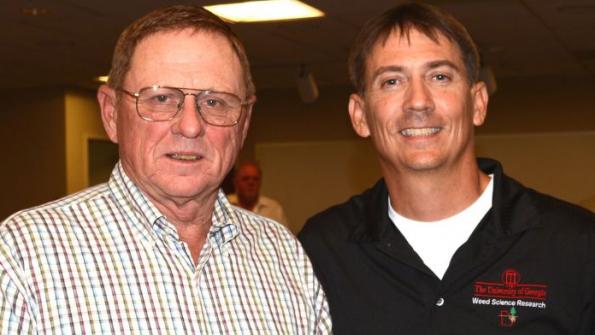
Education over regulation is vital for developing and maintaining a sustainable tool box to manage weeds, said Stanley Culpepper, returning to Williams Hall on the campus of his alma mater, North Carolina State University.
“We as weed scientists need to be much more aggressive with education over regulation,” Culpepper said in his Williams Hall lecture to students, faculty and others. “The EPA does not educate; they regulate. But we can use education if we’re creative to prevent regulations. This will be critical to long-term sustainability in keeping the tool box that we have intact.”
Culpepper, a North Carolina native, earned his Bachelor’s, Master’s and Ph.D. degrees in crop science from N.C. State. He is currently a professor in the Department of Crop and Soil Sciences at the University of Georgia with research and Extension responsibilities in weed management on a variety of crops. He is a worldwide recognized expert in herbicide-resistant weeds in cotton, vegetables and other crops.
On Nov. 10, Culpepper was the final speaker for the Arch Douglas Worsham Weed Science Lecture Series at N.C. State. The three-part series included lectures by nationally prominent weed scientists who are alumni of N.C. State’s College of Agriculture and Life Sciences. The title of Culpepper’s talk was “Developing and Maintaining a Sustainable Tool Box to Manage Weeds.”
In Culpepper’s audience were his former N.C. State professors Alan York and Arch Douglas Worsham, the now retired professor of weed science at N.C. State who has a national reputation in witchweed management, no-tillage systems and other important aspects of sustainable weed management. Culpepper was in the final cohort of students in Dr. Worsham’s Crop Science 414 course, the fundamental undergraduate course in weed science at N.C. State.
EPA challenge
From a pest management perspective, the EPA presents the greatest regulatory challenge to agriculture, Culpepper said. “EPA has many things on the docket that can challenge our sustainability. The Endangered Species Act is one of the greatest challenges that we will have to overcome."
In addition, EPA is honing in more aggressively on pesticide drift. “EPA is very concerned about pesticide drift. If we don’t address it, the EPA is going to address it through regulations so we developed a training program for growers in Georgia,” Culpepper said.
In the last two years, 1,882 Georgia growers were trained in how to safely use the various pesticide technologies. Culpepper noted that a survey of the growers who took the required training shows that 99.1 percent in 2015 and 99.5 percent in 2016 believed the training was worthwhile. In addition, the survey showed that 98 percent of the farmers believed it helped them to take measures to reduce pesticide drift.
“In one year, the amount of drift cases that we had reduced 48 percent without any regulation whatsoever. There is no government agency that can implement any regulatory plan that will reduce pesticide drift by 48 percent. If you do not preempt that regulation, that regulation in many ways can be problematic and limit your toolbox,” Culpepper said.
Culpepper said tank mixes are a vital part of the sustainable tool box for weed control.
Tank mixes
“I don’t believe the EPA wants to prohibit tank mixes,” he said. “They’re in a difficult situation. We do have an insecticide label that prohibits tank mixtures. We now have a herbicide label out that at least in the short term will prohibit tank mixtures. If we can’t tank mix herbicides, with the resistance issues that we have, we will have monumental problems. We will have less weed control.”
In addition, Culpepper said cover crops and tillage practices are critical parts of the weed management tool box. He noted that in south Georgia, rolled rye and clover are effective cover crops. For cover crops, the level of biomass provided and the sustainability of that biomass is vital.
“Rye will last the whole year. If you have a cover crop that lasts just three weeks, you will get just three weeks of control and here comes the palmer Amaranth and the other weed species,” he said.
The goal is to reduce the population of the weed you are trying to control by 90 to 95 percent. “If we can control or suppress these populations with something other than a herbicide, then that favored herbicide remains sustainable over time.”
For education to be more effective than regulation in weed management, Culpepper said cooperation among academia, industry and the regulatory agencies is needed. He said weed scientists need to work more closely with the state and federal agencies regulating them.
“It is absolutely critical that we work with these people to get them the right information. If we do not communicate and cooperate, we will only hurt our growers,” he said.
About the Author(s)
You May Also Like






